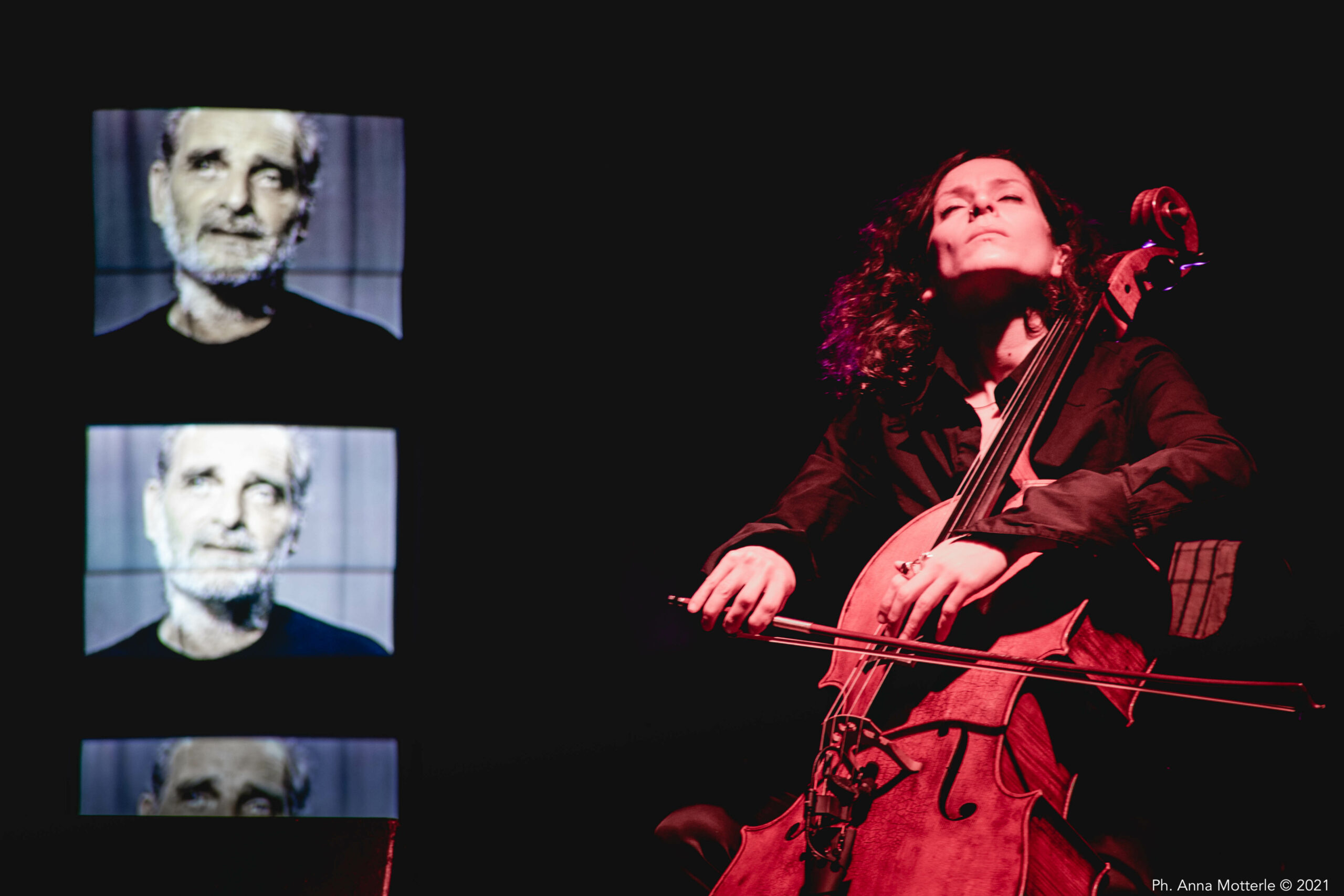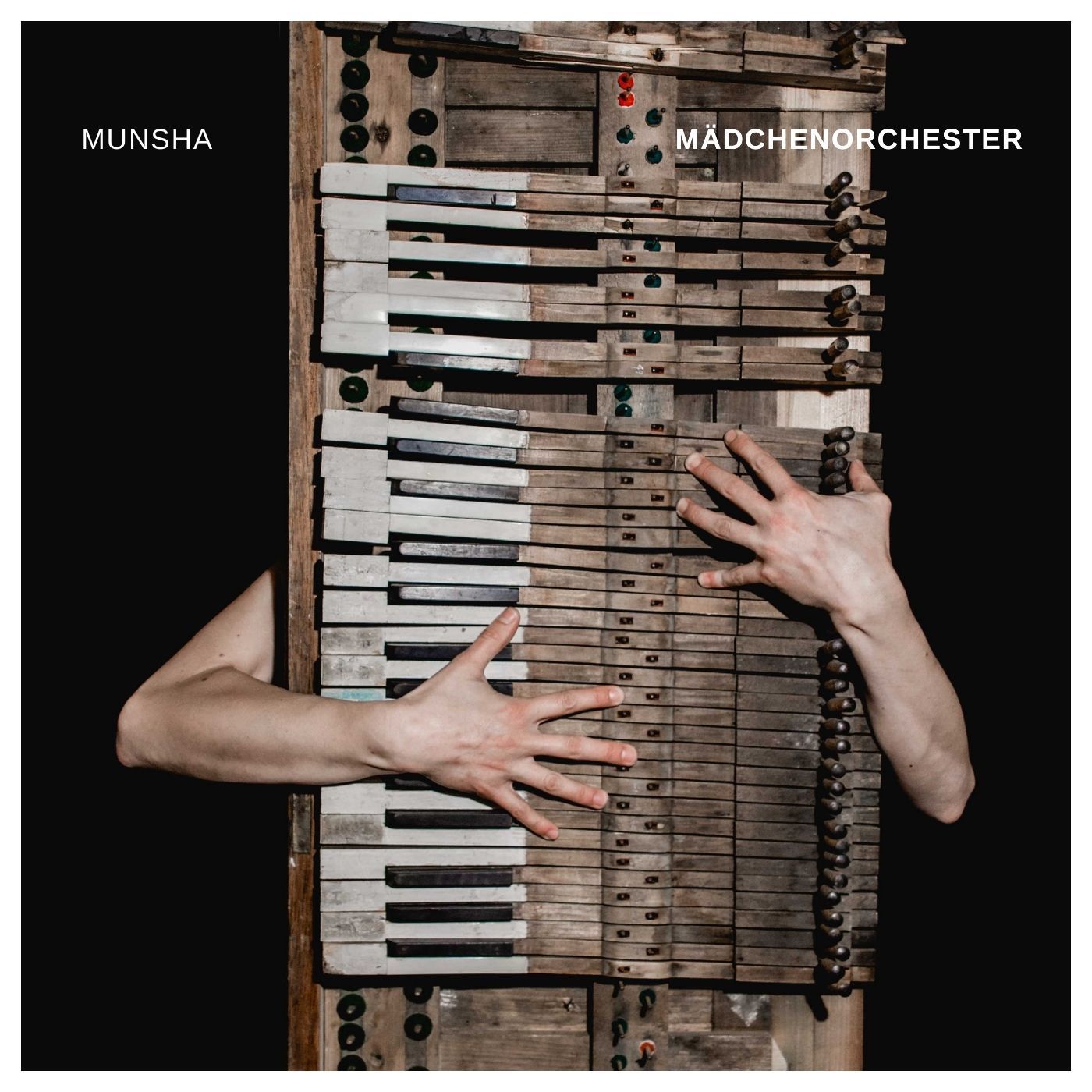“Munsha’s chameleonic sounds carry an almost epiphanic sense of bewilderment and wonder”.
“Das »Mädchenorchester«
ist ein Wunder
der Stilisierung”.
Neues Deutschland

Munsha is an Italian musician, composer and music educator based in Berlin.
Her activity as a musician and her many years of research in singing and experimental vocal techniques are reflected in the experimental scene, including theatre, dance and interdisciplinary art projects.
Her approach to music began at an early age with piano studies, which resulted in academic studies on the one hand and active participation in the punk and rock scene on the other.
After completing her studies in singing, composition for multimedia and cello (Salerno, Rome, Milan), she has performed as a vocal soloist and in ensembles on numerous stages.
Her dual background as an academic and as a performing musician has produced a style in which the rhythmic sharpness of rock music nestles into and coexists with unconventional harmonic structures as well as concrete sounds.
The focus of her compositions and music productions is on experimental and avant-garde music: Munsha’s combines an academic background, transcultural and pop music as well as technical expertise and covers a spectrum ranging from electronic, noise and drone music to songwriting and soundtracks.
Over the years she has composed music for theatre, dance and performative art, sound installations, and interdisciplinary productions, besides her solo project and several collaborations.
She is the music director and composer of the Berlin theatre company spreeagenten.
In 2021, she premiered as writer and director of the play “Alices Geschwister”, for which she also composed and performed the score.
In 2022, she became a jury member of the ‘Treffen Junge Musik’ of the Berliner Festspiele: a competition for young musicians and songwriters from all over Germany.
Since 2001, she has also dedicated herself to teaching music and singing in particular, with a focus on the use of the vocal tract and the practical use of the resonance spaces of the voice in music and theatre.
Munsha’s musical research work was most recently supported by Musikfonds.

MÄDCHENORCHESTER – Original-Soundtrack zum Theaterstück
Original soundtrack of the stage show Mädchenorchster – Musical theatre with classical and electronic music reminiscent of the members of the Women’s Orchestra of Auschwitz, by spreeagenten – Prod. © 2019.
Released on March 8th, 2022.
Available on BANDCAMP and Digital Music Stores.
A Munsha production, with the support of the Senate Department for Culture and Europe through Kulturprojekte Berlin.
Inching ever closer to the imminent release of the next album, MÄDCHENORCHESTER, Munsha has released two singles from the theatre score, Wolkenfamilie and Familienporträt.
Just like the theatrical production, the album is also based on the girls’ orchestra that was active in the Auschwitz-Birkenau concentration camp during the imprisonment of its members.
Especially Familienporträt wants to be a rip in a canvas, a delicate incursion into an imaginary cellar as if to secretly investigate the scents and tones of dusty memories.
Music composed, produced and perfomed by Munsha at FarF Studio Berlin. Mastering by Lorenzo Maffia [Storm digital recording studio].
Wolkenfamilien Mix: Francesco Galdieri | Lyrics: Susanne Chrudina | Live visual interventions : Dafne Narvaez Berlfein | Video editing : Sarnt Utamachote | Costumes and make-up: Anna Lilia Konishchev aka Swoosh Anatta.
Reviews [original language]
Die große Geschichte ist bekannt. Darin verborgen sind viele kleine und vergessene Geschichten. Die Schauspieler Richard Gonlag Jelena Bosanac und Željko Marović und die Musikerin Munsha holen das Vergessene an Originalschauplätzen zum Vorschein. So eindringlich ist Geschichte am Ort des Geschehens selten zu erleben. [Geschichtsspaziergang – Erinnern an das Berliner Scheunenviertel/Länderreport – Deutschlandfunk Kultur].
Die Straßen Berlins sind mehr als eine spannende Kulisse – sie sind stumme Zeitzeugen für das, wovon die Spreeagenten berichten…. [Neues-Deutschland] Zum Artikel
Eindrücklich erinnert „Häuser-Fluchten“ auf diese Weise an die Wichtigkeit von Zeitzeug*innen berichten und regt zum späteren Nachlesen an. [Taz] Zum Artikel
Eine wunderbare Einladung umunbekannte berliner Biographie kennenzulernen… [rbb- Inforadio]
Die beeindruckende Inszenierung verzichtet visuell auf Schreckensbilder. Das Bühnenbild ist auf wenige, allerdings sorgfältig ausgesuchte Details reduziert. (…) Die tödliche Bedrohung ist auch in der Bühnenmusik der Komponistin Munsha in jeder Sekunde zu spüren. [Inforadio]
Die Inszenierung ist eine des Verzichts. […] Jegliches real Äußerliches eines KZ braucht die Inszenierung nicht. Und doch ist all das Genannte anwesend. Es geht durch die Münder der jungen Menschen, lebt in ihren Gesten, in dem, was an Geräuschen und Musik dazu in Beziehung steht. Das »Mädchenorchester« ist ein Wunder der Stilisierung. [Neues Deutschland]
Die Inszenierung „Mädchenorchester“ vereint tatsächlich im KZ gespielte Musik mit zeitgenössischen Tönen, verdeutlicht, wie leicht sich Kunst für politische Zwecke missbrauchen lässt, und ist trotz allem ein Hoch auf ihre unersetzliche Kraft! [ARTE Fernsehen]
Am Bühnenrand sind zwei dünne Leinen gespannt, die Andeutung eines Zauns, aufs Äußerste reduziert wie alles in diesem Stück. Das Orchester spielt ein paar Takte aus Dvoraks Slawischen Tänzen, unterbrochen von elektronischen Klängen. Alte Lieder wechseln mit eigens komponierten Songs, eingebunden in eine Choreographie aus verhaltenen Bewegungen. Die Darsteller fügen sich zu atmenden Skulpturen, lösen sich voneinander, ihre Gesichter sind still, fast unbewegt, niemand grimassiert. Kein Schauspiel, eher ein Schattenspiel. […] Das Stück Mädchenorchester ist kein Melodram. […] Man könnte es mit einem Cluster vergleichen aus vielen, sich überlagernden, einander auch widersprechenden Stimmen. [Frankfurter Rundschau]
Harte, brutale Worte treffen in geradezu absurden Szenerien auf sanfte Töne. [Berliner Zeitung]
“Mädchenorchester” ist ein Stück über die Schönheit und Verletzlichkeit von Musik. […] Das Konzept, ein Jugendensemble auftreten zu lassen, geht hervorragend auf. Dabei greift das Stück elementare Fragen auf. Antworten finden sich in den leisen Zwischentönen. [Tagesspiegel]
Musiker und Darsteller bilden einen gemeinsamen Klangkörper der Erinnerungen. Es sind Erinnerungen des Schreckens und der Erniedrigung. […] Das Zusammenspiel von Berliner Schülern und Schauspiel- und Musikprofis verleiht der Aufführung Authentizität – auch die Mitglieder des Mädchenorchesters von Auschwitz waren zum Teil erst 16 Jahre alt. [rbb Fernsehen, Kowalski & Schmidt]
Die Inszenierung nimmt ein weniger bekanntes Kapitel der SS- Zeit in den Blick, nämlich den Missbrauch von Musik. Weibliche Häftlinge sehen im KZ unvorstellbares Grauen und müssen dazu Musik spielen. Musikalische Zwangsarbeit also. Mich hat das tief berührt, die Zitate der Zeitzeugen werden durch die Musik nochmal viel eindringlicher und auch das Publikum war total still und konzentriert […].[Radio Eins]
English translations
The big story is known. Hidden in it are many small and forgotten stories. The actors Richard Gonlag, Jelena Bosanac and Željko Marović and the musician Munsha bring the forgotten to light at original locations. It is rare to experience history so vividly at the site of the events.
[History Walk – Remembering Berlin’s Barn Quarter/Country Report – Deutschlandfunk Kultur]
The streets of Berlin are more than an exciting backdrop – they are silent witnesses to what the Spreeagents report…..
[Neues-Deutschland] To the article
In this way, “Häuser-Fluchten” is an impressive reminder of the in this way reminds us of the importance of contemporary witnesses and encourages us to read it again later. [Taz] To the article
A wonderful invitation to get to know unknown Berlin biography… [rbb- Inforadio]
The impressive production refrains visually from horror images. The stage design is reduced to a few, but carefully selected details. (…) The deadly threat can also be felt in every second of the stage music by composer Munsha. [Inforadio]
The staging is one of renunciation. […] Any real exterior of a concentration camp does not need the staging. And yet all that is mentioned is present. It passes through the mouths of the young people, lives in their gestures, in the sounds and music that relate to it. The “Girls’ Orchestra” is a miracle of stylisation. [Neues Deutschland]
The production “Girls’ Orchestra” combines music actually played in the concentration camp with contemporary sounds, illustrates how easily art can be misused for political purposes and is, despite everything, a cheer for its irreplaceable power! [ARTE Television]
Two thin lines are stretched along the edge of the stage, the suggestion of a fence, reduced to the extreme like everything in this piece. The orchestra plays a few bars from Dvorak’s Slavonic Dances, interrupted by electronic sounds. Old songs alternate with specially composed songs, integrated into a choreography of restrained movements. The performers form breathing sculptures, detach themselves from each other, their faces are still, almost unmoving, no one grimaces. Not a play, more a shadow play. […] The play Mädchenorchester is not a melodrama. […] One could compare it to a cluster of many, overlapping, even contradictory voices. [Frankfurter Rundschau]
Harsh, brutal words meet gentle tones in almost absurd settings. [Berliner Zeitung]
“Girls’ Orchestra” is a play about the beauty and vulnerability of music. […] The concept of having a youth ensemble perform works brilliantly. The piece takes up elementary questions. Answers are found in the quiet nuances. [Tagesspiegel]
Musicians and performers form a common body of sound of memories. They are memories of horror and humiliation. […] The interplay between Berlin schoolchildren and acting and music professionals lends the performance authenticity – some of the members of the Auschwitz girls’ orchestra were only 16 years old.
[rbb Fernsehen, Kowalski & Schmidt]
The production takes a look at a lesser-known chapter of the SS era, namely the abuse of music. Female prisoners see unimaginable horrors in the concentration camp and have to play music to accompany them. Musical forced labour, in other words. I was deeply touched by it, the quotes from the eyewitnesses became much more vivid through the music and the audience was also totally silent and concentrated […] [Radio Eins].
